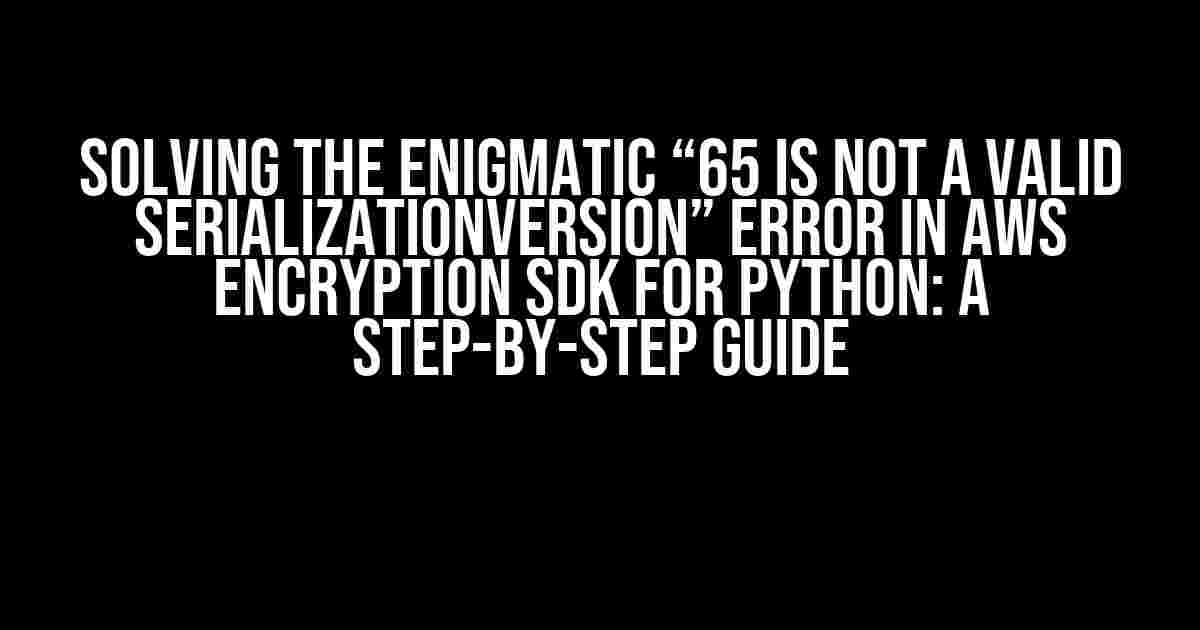Are you stuck with the frustrating “65 is not a valid SerializationVersion” error while trying to decrypt data using the AWS Encryption SDK for Python? Don’t worry, you’re not alone! In this comprehensive guide, we’ll delve into the causes of this error, and provide you with a clear, step-by-step solution to get you back on track.
What’s Behind the “65 is not a valid SerializationVersion” Error?
The AWS Encryption SDK for Python uses a serialization format to store and retrieve encrypted data. This format consists of a header, followed by the encrypted data. The header includes a version number, which indicates the format of the encrypted data. In this case, the error message is indicating that the version number ’65’ is not recognized as a valid SerializationVersion.
Possible Causes of the Error
- Incompatible SDK Versions: If you’re using an older version of the AWS Encryption SDK, it might not be compatible with the SerializationVersion used to encrypt the data.
- Corrupted or Tampered Data: If the encrypted data is corrupted or tampered with, the SerializationVersion might become invalid.
- Incorrect Decryption Key: Using the wrong decryption key or a key that’s not properly configured can lead to this error.
Step-by-Step Solution to Decrypt Data with the Correct SerializationVersion
Let’s walk through the steps to resolve the “65 is not a valid SerializationVersion” error and successfully decrypt your data.
Step 1: Verify the AWS Encryption SDK Version
First, ensure you’re using the latest version of the AWS Encryption SDK for Python. You can check the version using pip:
pip show aws-encryption-sdk-pythonIf you’re not running the latest version, update it using:
pip install --upgrade aws-encryption-sdk-pythonStep 2: Verify the Decryption Key
Make sure you’re using the correct decryption key. If you’re using AWS Key Management Service (KMS), ensure you have the correct KMS key ARN and permissions to decrypt the data.
Here’s an example of creating a decryption key:
import aws_encryption_sdk
# Create an AWS Encryption SDK client
client = aws_encryption_sdk.AWSEncryptionSDKClient()
# Define the decryption key
decryption_key = aws_encryption_sdk.KeyProvider(
key_id='arn:aws:kms:REGION:ACCOUNT_ID:key/KEY_ID',
region_name='REGION'
)Step 3: Load and Decrypt the Data
Now, load the encrypted data and decrypt it using the correct SerializationVersion. In this example, we’ll use the ` encrypt` method to load the encrypted data and then decrypt it:
import aws_encryption_sdk
from aws_encryption_sdk.identifiers import SerializationVersion
# Load the encrypted data
with open('encrypted_data.bin', 'rb') as file:
encrypted_data = file.read()
# Decrypt the data using the correct SerializationVersion
decrypted_data, _ = client.decrypt(
source=encrypted_data,
key_provider=decryption_key,
serialization_version=SerializationVersion.V2
)Step 4: Verify the Decrypted Data
Finally, verify that the decrypted data is correct and matches the original plaintext data.
# Verify the decrypted data
print(decrypted_data.decode('utf-8'))Troubleshooting Tips and Variations
If you’re still encountering issues, try these troubleshooting tips:
- Check the encrypted data format: Ensure the encrypted data is in the correct format and not corrupted.
- Verify the decryption key permissions: Ensure the decryption key has the necessary permissions to decrypt the data.
- Use the correct SerializationVersion: Make sure you’re using the correct SerializationVersion that matches the version used during encryption.
In some cases, you might need to use custom encryption algorithms or manage your own encryption keys. In such scenarios, refer to the official AWS Encryption SDK documentation for Python and AWS Key Management Service (KMS) guides.
Conclusion
The “65 is not a valid SerializationVersion” error in AWS Encryption SDK for Python can be solved by verifying the SDK version, decryption key, and SerializationVersion. By following this step-by-step guide, you should be able to successfully decrypt your data and get back to developing your application. Remember to always keep your SDK and decryption keys up-to-date, and to verify the encrypted data format to avoid any potential issues.
| Keyword | Explanation |
|---|---|
| aws-encryption-sdk-python | AWS Encryption SDK for Python, used for encrypting and decrypting data. |
| SerializationVersion | A version number indicating the format of the encrypted data. |
| Decryption Key | A key used to decrypt encrypted data, often managed by AWS Key Management Service (KMS). |
By following this comprehensive guide, you’ll be able to resolve the “65 is not a valid SerializationVersion” error and ensure secure and efficient data encryption and decryption using the AWS Encryption SDK for Python.
Frequently Asked Question
Are you struggling with the dreaded “65 is not a valid SerializationVersion” error while trying to decrypt with the AWS Encryption SDK in Python? Don’t worry, we’ve got you covered! Here are some frequently asked questions and answers to help you troubleshoot and resolve this frustrating issue.
What does the “65 is not a valid SerializationVersion” error mean?
This error typically occurs when the version of the AWS Encryption SDK used for encryption is incompatible with the version used for decryption. In this case, the SerializationVersion 65 is not recognized by the SDK version you’re using for decryption.
How can I determine the SerializationVersion used for encryption?
You can use the AWS Encryption SDK to determine the SerializationVersion used for encryption by examining the ciphertext. The SerializationVersion is stored in the header of the encrypted data. You can use the `aws-encryption-sdk` Python package to parse the ciphertext and retrieve the SerializationVersion.
Can I downgrade my AWS Encryption SDK to a compatible version?
Yes, you can downgrade your AWS Encryption SDK to a compatible version. However, be aware that downgrading might expose you to security vulnerabilities or compatibility issues. It’s essential to evaluate the trade-offs and consider upgrading to a newer version that supports the required SerializationVersion instead.
Is there a way to upgrade my ciphertext to a newer SerializationVersion?
Yes, you can re-encrypt your ciphertext using a newer version of the AWS Encryption SDK, which will upgrade the SerializationVersion. This process involves decrypting the original ciphertext using the original encryption key and then re-encrypting it using a newer SDK version and a new encryption key.
What are some best practices to avoid SerializationVersion mismatches in the future?
To avoid SerializationVersion mismatches, it’s essential to use the same SDK version for both encryption and decryption. Additionally, consider implementing a version control strategy for your encryption keys and ciphertext to ensure that you can track changes and maintain compatibility. Regularly review and update your encryption workflows to ensure they’re aligned with the latest SDK versions and best practices.


